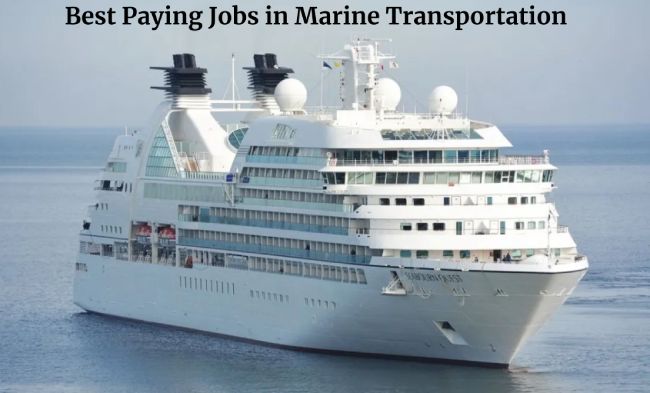Marine transportation is a fulfilling and lucrative career path, with many opportunities for advancement. Those looking to make a living in this industry will want to familiarize themselves with some of the best-paying jobs in marine transportation.
Piloting ships can be one of the highest-paid positions in marine transport. Pilots guide vessels through unfamiliar waters, negotiate safe navigation routes and monitor current traffic conditions. They are typically compensated well for their expertise and years of experience navigating the seas.
Engineering jobs also offer good salaries within the industry. Marine engineers design propulsion systems, develop new power sources, build infrastructure components, and maintain mechanical equipment. Engineers must possess an understanding of fluid dynamics and vessel systems to work effectively on these projects, making it a highly sought-after skill set worthy of a high salary range.

Best Paying Jobs in Marine Transportation
Port Engineer- $92,722 Average Salary
For those interested in marine transportation and looking for the best-paying jobs, a port engineer position is one that should not be overlooked. According to salary.com, these positions boast an average salary of $92,722 per year – making it one of the highest-paid positions in this field.
The duties of a port engineer include tackling any technical or engineering problems that may arise related to maritime operations as well as providing maintenance and repair services on vessels both large and small.
Additionally, they can be involved in designing new vessels, overseeing the construction process, and inspecting ships prior to operation. This demanding job requires strong knowledge of mechanical repairs and engineering principles as well as excellent problem-solving skills.
Employment opportunities for port engineers are available across the globe with larger ports having more potential openings than smaller ones.
Marine Engineer- $91,250 Average Salary
Marine engineering is one of the best-paying jobs in marine transportation, with an average annual salary of $91,250. A career as a marine engineer involves working on ships and submarines, designing and building them to be seaworthy vessels.
This lucrative profession requires a deep knowledge of shipbuilding technology combined with excellent problem-solving skills.
The job responsibilities of a marine engineer include overseeing the installation and maintenance of engine systems on ships or submarines, monitoring fuel consumption and propulsion performance, troubleshooting mechanical issues, calculating maximum speed capabilities for each vessel, ensuring safety regulations are followed at all times, and advising captains on navigation. Marine engineers must also possess strong computer literacy skills in order to work with modern software systems used for designing maritime vessels.
Sailing Master- $79,931 Average Salary
Marine transportation is an exciting and rewarding field to be a part of. Those that work in this field can expect to earn excellent salaries, with sailing master positions among the highest-paying jobs available. According to PayScale, sailing masters make an average salary of $79,931 annually.
Sailing masters are responsible for navigating ships safely over the open seas and working closely with other members of a ship’s crew. They must have a thorough knowledge of navigation techniques and laws governing marine transportation as well as experience in controlling and operating vessels on the open water. In addition to their technical duties, sailing masters must also have strong leadership skills in order to ensure smooth operations aboard their vessels.
Those interested in pursuing a career as a sailing master should consider taking courses in navigation, seamanship, meteorology, and other related topics at specialized maritime institutions or universities.
Marine Superintendent- $84,100 Average Salary
Marine superintendents are responsible for the overall management of marine transportation operations. With an average salary of $84,100 per year, the marine superintendent is among the best-paying jobs in marine transportation.
It is a highly demanding position and requires expertise in managing cargo transport activities as well as overseeing all other aspects of maritime operations including vessel maintenance and crewing.
Achieving success in this role involves a combination of technical know-how coupled with strong communication, interpersonal and leadership skills. As there are many safety and environmental regulations related to marine transportation, those interested in becoming marine superintendents must have knowledge of relevant laws, rules, and regulations and be prepared to enforce them effectively. Marine superintendents must also possess excellent problem-solving capabilities as they often need to resolve difficult operational issues quickly and efficiently.
Marine Surveyor- $74 448 Average Salary
Are you looking for a career that pays well and has plenty of opportunity for growth? Marine surveyors are among the best-paying jobs in marine transportation, and with an average annual salary of $74 448, it’s no wonder many people are pursuing this profession.
A marine surveyor is engaged in surveying vessels to ensure they meet international safety regulations. They inspect all areas of the vessel from the hull to the machinery, as well as advise on repairs and maintenance. The job requires knowledge of engineering principles, safety standards, and shipbuilding practices. It also requires strong communication skills to ensure that both the company owners and crew understand their findings.
If you’re interested in pursuing a career as a marine surveyor, you should expect high salaries in exchange for your expertise.
Dock Worker-$42,375 Average Salary
Paid work along the docks of many ports around the globe can be a rewarding and lucrative career. There are several marine transportation jobs that provide great pay, with dock workers often receiving an average salary of $42,375 according to recent studies. Working as a dock worker is one of the best-paying jobs in marine transportation.
Dock workers are responsible for loading and unloading cargo from boats and other vessels onto the port docks. They must monitor goods arriving and departing from port locations, help direct traffic on the docks, keep detailed records, organize shipments to ensure timely delivery, and control any potential safety or security risks. Dock workers require excellent organizational skills as well as an understanding of maritime operations in order to be successful at their job.
Diving Supervisor- $68,341 Average Salary
Are you looking for a rewarding career in marine transportation? A diving supervisor may be the perfect job for you. With an average salary of $68,341, this job is one of the best-paying jobs in Marine Transportation.
The duties of a diving supervisor include supervising and planning all aspects of underwater activities such as safety checks, ensuring proper equipment maintenance is followed, and monitoring progress on dive sites.
Diving supervisors are also responsible for training divers to properly perform their tasks and providing guidance during actual dives. In addition to these duties, diving supervisors must also have knowledge about maritime law and regulations that apply to their work environment.
If you are interested in becoming a diving supervisor, it is important to obtain the necessary certification from an accredited organization like the American Board of Underwater Instructors or the Professional Association of Diving Instructors (PADI).
Ship Pilots-$89,740 Average Salary
The marine transportation industry is one of the best-paying industries in the world. Ship pilots are among the top earners with an average salary of $89,740 per year. This figure is well above the national median income and puts ship pilots among some of the highest-paid professionals in all of maritime transportation.
Working as a ship pilot requires extensive experience and skill to maneuver large vessels safely and efficiently through waterways, ports, harbors, and other bodies of water. In addition to these duties, ship pilots must also be able to read charts, interpret weather conditions for safe navigation, keep accurate logs and records, as well as coordinate with other crewmembers on board. The high level of responsibility makes it one of the most rewarding jobs within marine transportation.
The job market for ship pilots has been steadily growing over the years due to increased demand for shipping services around the world.
Cargo Ship Workers- $70,609 Average Salary
Cargo ship workers are some of the highest-paid marine transportation professionals in the world. According to a recent report by Salary.com, cargo ship workers earn an average of $70,609 per year, making it one of the best-paying jobs in marine transportation available today. It is a field that has long been seen as one of the most lucrative career paths out there and continues to be so even today.
Employment opportunities for those looking for work on cargo ships have grown significantly over the past few years due to increased global trade and demand for goods being shipped around the world on these vessels. The job typically requires individuals to transport goods from port to port while dealing with paperwork and ensuring compliance with maritime regulations at each stop along the way. Cargo ship workers also provide assistance in loading and unloading shipments, which can sometimes involve hazardous materials or other dangerous elements.
Maritime Lawyers- $86,514 Average Salary
Maritime lawyers are some of the best-paid professionals in the marine transportation industry. This career is well-suited for those who have a passion for law and maritime matters, while also being able to work within a legal framework that applies to matters related to ships and other sea vessels. The average salary for maritime lawyers is $86,514 per year according to PayScale, making it one of the highest-paying jobs in marine transportation.
Maritime lawyers advise clients on all aspects of international shipping, such as contracts, taxation issues, disputes related to shipping operations, and more. They must be familiar with international regulations governing maritime law as well as the laws of specific countries regarding marine transportation. Maritime lawyers often represent both private individuals and companies in their legal affairs; therefore having strong negotiation skills is beneficial.
Commercial Divers- $60,000 to $148,000
Commercial divers are some of the highest-paid professionals in marine transportation. According to the Bureau of Labor Statistics, these experts can earn from $60,000 to an impressive $148,000 annually. Working underwater for long hours and in sometimes hazardous environments requires skilled professionals who have special training and experience. Marine transportation includes a variety of tasks that involve working with specialized equipment such as underwater robots, submarines, and research vessels.
The job description of commercial divers includes the maintenance and repair of ships’ hulls or platforms like oil rigs that operate in deep water depths. They also survey submerged structures to determine their stability and safety or search for sunken vessels or objects on behalf of governments or private companies. The work may require long hours under harsh conditions due to extreme temperatures or limited visibility but it is often considered one of the best-paying jobs in marine transportation available today.
Admirals- $110,000+
The job of an Admiral in the marine transportation industry is a highly sought-after position and one of the best-paying jobs available. Admirals are responsible for maintaining order on vessels, ensuring communication between personnel, and making crucial decisions when necessary. With a staggering salary of $110,000 per year, it’s no wonder why many choose to pursue this profession.
Admirals must have extensive knowledge of maritime law and regulations as well as experience in navigating ships in both calm and turbulent glasses of water. They are also required to demonstrate strong leadership capabilities by managing personnel effectively while maintaining a safe vessel.
Additionally, they must possess excellent problem-solving skills to handle any unexpected situations that may arise during their shift. Admirals must also be able to work long hours with little or no rest in order to ensure the safety of all passengers aboard the vessel.
